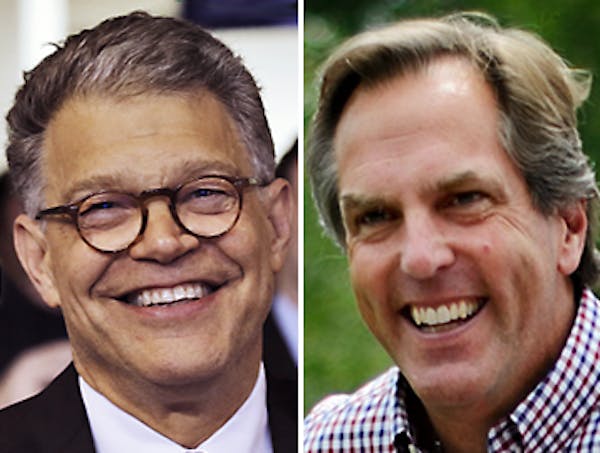University of Minnesota students arrived to Northrop Plaza Tuesday lured by the scent of dozens of Domino's pizzas courtesy of the school's Voterpalooza event. They stayed to hear U.S. Sen. Al Franken make his case for re-election by addressing a topic that is just as central to the college experience.
"We now have $1.2 trillion in student debt in this country," Franken said during a 15-minute speech that drew whoops of approval from a friendly crowd. "You can refinance a home loan, you can refinance a business loan, you can refinance a car loan. Why shouldn't you be able to refinance student loans?"
Hours later, Mike McFadden, Franken's GOP challenger, got his turn. In an uncharacteristically fiery speech, he pounded his fist on the lectern at Coffman Memorial Union, telling a packed room of students: "College tuition has grown at almost double the rate of inflation in the last 20 years. That's unacceptable."
The appearances provided a glimpse into the strategy of the campaigns as they reach out to young voters, a key demographic that could play a major role in the 2014 Senate race. According to a Star Tribune Minnesota Poll, Franken and McFadden were tied at 39 percent among voters aged 18 to 34, while 20 percent remained undecided. While addressing the students, each candidate refrained from criticizing his opponent — rarely, if ever, mentioning the other by name.
The students were engaged, with even Franken supporters expressing disappointment that he had declined to take part in a debate with McFadden, a confrontation they said would have filled hundreds more seats. They settled for a Franken speech and a question-and-answer period with McFadden. Despite differences in duration and delivery, the sessions showed the candidates have much in common.
Moments after McFadden concluded, Black Student Union president Mike Ampaabeng clutched a sign that read "Mike McFadden thinks millionaires are more important than me." Still, he admitted he was surprised by the GOP candidate's performance.
"He's definitely more of a progressive Republican, not as conservative as other candidates I've seen in other states, which I do appreciate," said Ampaabeng, who remains undecided on the Senate race. "Personally, it's more for me about what he's going to do to work with other politicians in Washington."
Franken's low-key address focused on three key issues: Net neutrality, climate change and the rising cost of college tuition, including his bill to refinance student loans that was blocked in the Senate earlier this summer.
Franken didn't address the recent airstrikes on terror targets in Syria, while McFadden expressed support of President Obama's plan for combating Islamic militants — although the candidate asserted that the lack of a coherent foreign policy led to the emergence of that threat.
Mica Grimm, a campus organizer for Minnesota Public Interest Resource Group, a nonprofit that helped sponsor the events, said she noticed that Franken "was trying to tread lightly around the bombing," but said she was satisfied that he addressed the Net neutrality issue. Proposals by the FCC to offer a "fast lane" for Internet speeds to websites willing to pay for the service means more than Netflix downloads, she said.
"I really do feel like the Internet breaks the matrix a little bit. On Twitter when Palestinians were tweeting to Ferguson citizens, that's a profound moment that I think could be easily restricted if there's less access to Internet coverage," said Grimm, who also remains undecided.
Although McFadden never mentioned Net neutrality in his Q&A, he said he "absolutely" supports having students be able to refinance their debt, but warned it will cost taxpayers $60 billion. It can be paid for by cutting costs elsewhere, he said.
Criminal justice major Jacob Ames wandered into McFadden's forum after a class on social change. A moderate conservative, he said he was impressed with McFadden and is leaning toward voting for the Republican, although he wants to hear more from Franken.
"He's actually a lot more moderate than he was on the ads," Ames said, adding that he particularly admired McFadden's openness in addressing the Middle East crisis.
John Reichl, a senior and vice president of the U's Minnesota Student Association, was "very disappointed" with Franken for declining to debate McFadden on campus. Despite that, it's unlikely to dilute his support for the incumbent, particularly for his views on climate change.
"I think this is going to be one of our biggest challenges of our generation, and how can we be thinking forward," Reichl said. "I think that's something the U.S. can be doing a better job on, and when I think about who I'm going to vote for, I want to vote for someone who's going to be pushing that issue forward."
Climate change was an issue McFadden also embraced, saying unequivocally, "I believe in climate change," before discussing rising energy costs.
Abby Simons • 651-925-5043
